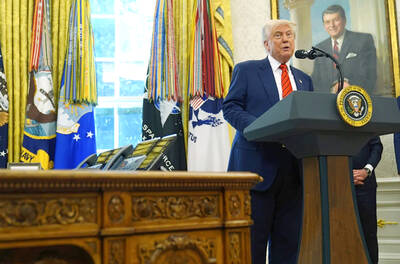Iran and Saudi Arabia on Friday agreed to re-establish diplomatic relations and reopen embassies after seven years of tensions.
The major diplomatic breakthrough negotiated with China lowers the chance of armed conflict between the Mideast rivals — both directly and in proxy conflicts around the region.
The deal, struck in Beijing this week amid its ceremonial Chinese National People’s Congress, represents a major diplomatic victory for Beijing, as Gulf Arab states perceive the US slowly withdrawing from the wider Middle East. It also came as diplomats have been trying to end a long war in Yemen, a conflict in which Iran and Saudi Arabia are deeply entrenched.

Photo: EPA-EFE
The two countries released a joint communique on the deal with China, which brokered the agreement as Chinese President Xi Jinping (習近平) was awarded a third five-year term as leader earlier on Friday.
Xi, whose administration in the past few days has relaunched a campaign to challenge the US-led Western liberal order with warnings of “conflict and confrontation,” was credited in a trilateral statement with facilitating the talks through a “noble initiative” and having personally agreed to sponsor the negotiations that lasted from Monday through Friday.
Videos showed Iranian Supreme National Security Council Secretary Ali Shamkhani meeting with Saudi Arabian National Security Adviser Musaad bin Mohammed al-Aiban and Chinese Central Foreign Affairs Commission Director Wang Yi (王毅).
The statement calls for re-establishing ties and reopening embassies “within a maximum period of two months.” A meeting by their foreign ministers is also planned.
The UN welcomed the Saudi Arabian-Iranian rapprochement and thanked China for its role.
“Good neighborly relations between Iran and Saudi Arabia are essential for the stability of the Gulf region,” UN spokesman Stephane Dujarric said.
The US also welcomed “any efforts to help end the war in Yemen and de-escalate tensions in the Middle East region,” White House press secretary Karine Jean-Pierre said.
However, the US Department of State offered a word of caution about an agreement in which the US seems to have played no part.
“Of course, it remains to be seen whether the Iranian regime will honor their side of the deal,” it said.
China, which last month hosted Iranian President Ebrahim Raisi, is a top purchaser of Saudi Arabian oil. Xi visited Riyadh in December last year for meetings with oil-rich Gulf Arab nations crucial to China’s energy supplies.
However, it does not provide the same military protections for Gulf Arab states as the US, making Beijing’s involvement that much more notable.
It was unclear what this development meant for Washington. Although long viewed as guaranteeing Mideast energy security, regional leaders have grown increasingly wary of US intentions after its chaotic withdrawal from Afghanistan in 2021.
The White House bristled at the notion that the agreement in Beijing suggests a rise of Chinese influence in the Mideast.
“I would stridently push back on this idea that we’re stepping back in the Middle East — far from it,” US National Security Council spokesman John Kirby said.
Mark Dubowitz, CEO of the Foundation for the Defense of Democracies, said that renewed Iran-Saudi Arabia ties via Chinese mediation “is a lose, lose, lose for American interests.”
“Beijing adores a vacuum,” he added.

A new online voting system aimed at boosting turnout among the Philippines’ millions of overseas workers ahead of Monday’s mid-term elections has been marked by confusion and fears of disenfranchisement. Thousands of overseas Filipino workers have already cast their ballots in the race dominated by a bitter feud between President Ferdinand Marcos Jr and his impeached vice president, Sara Duterte. While official turnout figures are not yet publicly available, data from the Philippine Commission on Elections (COMELEC) showed that at least 134,000 of the 1.22 million registered overseas voters have signed up for the new online system, which opened on April 13. However,

ALLIES: Calling Putin his ‘old friend,’ Xi said Beijing stood alongside Russia ‘in the face of the international counter-current of unilateralism and hegemonic bullying’ Chinese President Xi Jinping (習近平) yesterday was in Moscow for a state visit ahead of the Kremlin’s grand Victory Day celebrations, as Ukraine accused Russia’s army of launching air strikes just hours into a supposed truce. More than 20 foreign leaders were in Russia to attend a vast military parade today marking 80 years since the defeat of Nazi Germany in World War II, taking place three years into Russia’s offensive in Ukraine. Putin ordered troops into Ukraine in February 2022 and has marshaled the memory of Soviet victory against Nazi Germany to justify his campaign and rally society behind the offensive,

CONFLICTING REPORTS: Beijing said it was ‘not familiar with the matter’ when asked if Chinese jets were used in the conflict, after Pakistan’s foreign minister said they were The Pakistan Army yesterday said it shot down 25 Indian drones, a day after the worst violence between the nuclear-armed rivals in two decades. Pakistani Prime Minister Shehbaz Sharif vowed to retaliate after India launched deadly missile strikes on Wednesday morning, escalating days of gunfire along their border. At least 45 deaths were reported from both sides following Wednesday’s violence, including children. Pakistan’s military said in a statement yesterday that it had “so far shot down 25 Israeli-made Harop drones” at multiple location across the country. “Last night, India showed another act of aggression by sending drones to multiple locations,” Pakistan military spokesman Ahmed

US President Donald Trump on Wednesday said that he would make a decision about how the US government would refer to the body of water commonly known as the Persian Gulf when he visits Arab states next week. Trump told reporters at the White House that he expects his hosts in Saudi Arabia, Qatar and the United Arab Emirates will ask him about the US officially calling the waterway the Arabian Gulf or Gulf of Arabia. “They’re going to ask me about that when I get there, and I’ll have to make a decision,” Trump said. “I don’t want to hurt anybody’s